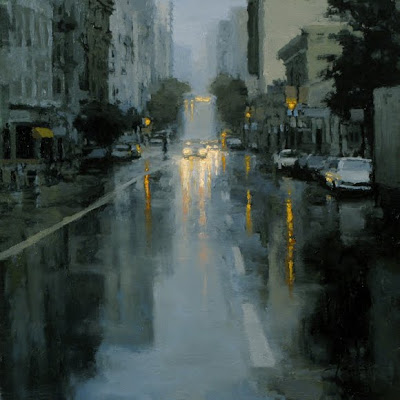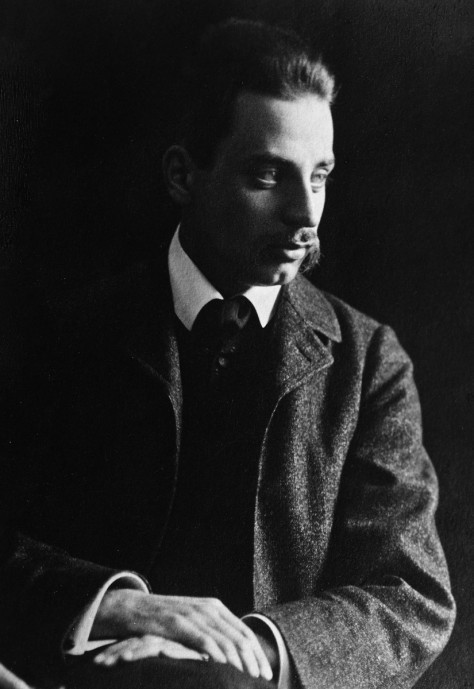Robert Walser
 Monday, July 5, 2010 at 02:47
Monday, July 5, 2010 at 02:47 An essay on this Swiss writer by this German man of letters. You can read the original here.
You can read a lot by Robert Walser, but nothing about him. What then is known by the few among us who understand how to take these venal barbs the right way? Not that the hack writer yearning for glory would "elevate" himself to such matters, but that he would employ their contemptible, improbable readiness to gain in vivacity and pureness. Only few know what we are to make of this "minor form," as Alfred Polgar called it, and how much hope from the brash pillars of so-called "great books" fluttered in their own humble chalices. And others haven't the slightest notion as to why they should be grateful to a Polgar, a Nessel or a Walser for their tender or spinous blossoms in the desolate pages of their unflowered fields. To Walser, as it were, they would come last. The first stimulation of their carefully gathered knowledge – the only feature of their writing – advises them to consider harmless the "polished" and "patrician" form of those things whose content they deem nugatory. And it is precisely in the work of Robert Walser that an entirely unusual, often hard-to-describe neglect surfaces. That this nullity carries weight and this absentmindedness longevity would be the last qualities you would guess belonged to Walser's works.
 Not to say that they're easy. We are accustomed to seeing the puzzle of an author's style emerge through more or less honed and intentional artistic works; yet now we are confronted with linguistic imbrutement that, while obvious, is utterly unintentional and nevertheless attractive and captivating. Confronted with an ease of hand that displays all emotions from bitterness to grace. Seemingly, we believed, unintentional. Often has it been debated as to whether this is true. But this is a moot point, and one notices it when one considers Walser's confession that he never edited or amended a single line. One need not believe him, of course, but it would be better to do so. Yet one may take solace in the following insight: to write and never to edit or amend is the perfect intersection of both extreme unintentionality and greatest intent.
Not to say that they're easy. We are accustomed to seeing the puzzle of an author's style emerge through more or less honed and intentional artistic works; yet now we are confronted with linguistic imbrutement that, while obvious, is utterly unintentional and nevertheless attractive and captivating. Confronted with an ease of hand that displays all emotions from bitterness to grace. Seemingly, we believed, unintentional. Often has it been debated as to whether this is true. But this is a moot point, and one notices it when one considers Walser's confession that he never edited or amended a single line. One need not believe him, of course, but it would be better to do so. Yet one may take solace in the following insight: to write and never to edit or amend is the perfect intersection of both extreme unintentionality and greatest intent.
So far, so good. Yet this can in no way prevent this neglect from getting to the bottom of things. We have already said that it contains all forms. Now we add: with the exception of one. Namely that one most common form which depends on the contents and on nothing more. For Walser, the How of his work is so secondary that everything he has to say goes completely against the meaning of his text. One could say that in his writing he, well, kicks the bucket. That point should be explained. And here is where one stumbles upon the very Swiss element of this writer – his shame. The following story comes from Arnold Böcklin, his son Carlo and Gottfried Keller: they were sitting one day, as was often the case, in an inn. Their regular table had already long since become famous thanks to the laconic and reticent manners of its clientele. This time as well the drinking partners sat together in silence. Then, after a long time had passed, the young Böcklin remarked: "It's hot." And a quarter of an hour later the elder Böcklin quipped: "And calm." For his part Keller waited a while; then he stood up with the words: "I do not wish to drink during idle chatter." This rustic, countrified shame in talking, met with an eccentric witticism, is Walser's thing. Hardly had he taken up his pen when he was overcome by a desperado mood. Everything seemed forlorn to him, and a torrent of words gushed forth in which every sentence's sole task was the make you forget the preceding sentences. When he in a virtuoso piece transforms the monologue "he has to walk down this empty street" into prose, he begins with the classic words "down this empty street." But here his William Tell is already beset by fear, and he seems weak, small, lost, and so he continues: "Down this empty street, I think, he has to walk."
Certainly some similarities could be detected. This prudish, artistic awkwardness in all language matters is the inheritance of fools. If Polonius, the embodiment of garrulousness, is a juggler, Walser adorns himself like Bacchus with wreaths of language that will overthrow him. Indeed, a wreath is the picture of his sentences. The thought, however, that stumbles upon this is a dawdler, thug and genius, like the heroes in Walser's prose. As it were, he can only depict heroes and can never shake himself free of his main characters. He even drops the matter in his three early novels so that he henceforth can live alone in brotherhood with hundreds of his favorite layabouts.
There are already some great examples in Germanic literature of the pococurante, good-for-nothing dawdler hero. A master of such characters, Knut Hamsun, has just been celebrated. Eichendorff with his good-for-nothing and Hebel, who created the Zundel brothers, are others. How do Walser's characters function in this society? And where are they from? Where the good-for-nothing is from, we already know. From the woods and valleys of Romantic Germany. The Zundel brothers are derived from the rebellious, enlightened bourgeoisie of the Rhein cities at the turn of the century. Hamsun's characters come from the primeval world of the fjords – people whose homesickness drives them to wander about aimlessly. And Walser's? Perhaps from the Glarus mountains? Appenzell's meadows, where he's from? Not from there, either. They come from the night, blackest night, a Venetian night, if you will, lit by the comfortless lanterns of hope, with a solid sheen in their eyes, yet disturbed and sad enough to cry. And what they cry is prose. Sobbing is the melody of Walser's garrulousness. It reveals to us where his loves come from – from madness, as it were, and from nowhere else. There are characters who have their madness behind them and remain entrapped in a disruptive, so completely inhuman and unflinching superficiality. If one wanted to name the happy and eerie facets to these characters in one word, one would use the word "healed." Of course, we never learn anything of the healing process unless we take his "Snow White" – one of the most profound works of modern writing – which alone would suffice to make us understand why this apparently most misinterpreted of all writers was a favorite of the merciless Franz Kafka.
These stories are extraordinarily tender – that much is clear enough to everyone. Yet not everyone sees that therein lies not the nervous tension of the decadent, but the pure and brisk mood of the convalescing life. "I am horrified at the thought of having success in this world," said Walser in a paraphrase of Franz Moor's dialogue. All his heroes share this fear. But why? In no way owing to repulsion and antipathy, a resentment in mores or pathos, but for completely epicurean reasons. They wish to enjoy themselves. And for that they have an utterly unusual fate, as well as an utterly unusual nobility and right. No one, you see, enjoys life as much as the convalescent. He is quite distant from the orgiastic; the flow of his renewed blood sounds like the purling of streams and his breath from his lips comes from the treetops. This child-like nobility is shared by Walser's people and fairy tale characters, who also appear out of the night and madness, the madness of myth. One usually is of the opinion that this awakening achieved perfection in the positive religions. If that were the case then it took place in no very simple or unambiguous form. This should be handled in the course of the great profane debate with myth that fairy tales provide. Of course, these characters do not possess any simple similarity to Walser's creations. They fight to free themselves from suffering. And Walser enters where the fairy tales stop. "And if we're not dead, then we will still be living today." Walser shows how they live. His things are, and here I will end as he begins: stories, essays, poetry, shorter prose, and suchlike.








